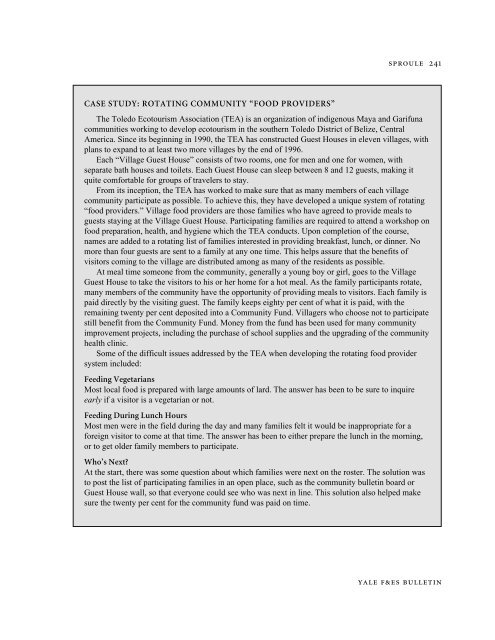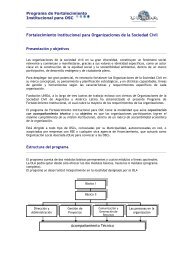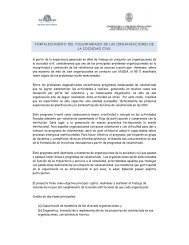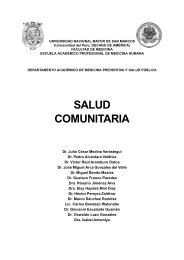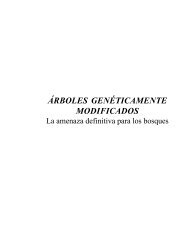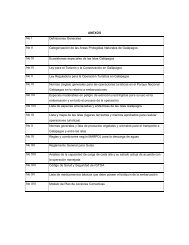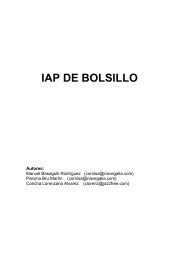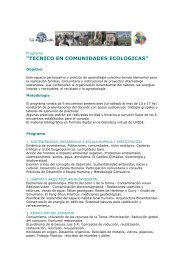Community-Based Ecotourism Development - Yale University
Community-Based Ecotourism Development - Yale University
Community-Based Ecotourism Development - Yale University
You also want an ePaper? Increase the reach of your titles
YUMPU automatically turns print PDFs into web optimized ePapers that Google loves.
SPROULE 241<br />
CASE STUDY: ROTATING COMMUNITY “FOOD PROVIDERS”<br />
The Toledo <strong>Ecotourism</strong> Association (TEA) is an organization of indigenous Maya and Garifuna<br />
communities working to develop ecotourism in the southern Toledo District of Belize, Central<br />
America. Since its beginning in 1990, the TEA has constructed Guest Houses in eleven villages, with<br />
plans to expand to at least two more villages by the end of 1996.<br />
Each “Village Guest House” consists of two rooms, one for men and one for women, with<br />
separate bath houses and toilets. Each Guest House can sleep between 8 and 12 guests, making it<br />
quite comfortable for groups of travelers to stay.<br />
From its inception, the TEA has worked to make sure that as many members of each village<br />
community participate as possible. To achieve this, they have developed a unique system of rotating<br />
“food providers.” Village food providers are those families who have agreed to provide meals to<br />
guests staying at the Village Guest House. Participating families are required to attend a workshop on<br />
food preparation, health, and hygiene which the TEA conducts. Upon completion of the course,<br />
names are added to a rotating list of families interested in providing breakfast, lunch, or dinner. No<br />
more than four guests are sent to a family at any one time. This helps assure that the benefits of<br />
visitors coming to the village are distributed among as many of the residents as possible.<br />
At meal time someone from the community, generally a young boy or girl, goes to the Village<br />
Guest House to take the visitors to his or her home for a hot meal. As the family participants rotate,<br />
many members of the community have the opportunity of providing meals to visitors. Each family is<br />
paid directly by the visiting guest. The family keeps eighty per cent of what it is paid, with the<br />
remaining twenty per cent deposited into a <strong>Community</strong> Fund. Villagers who choose not to participate<br />
still benefit from the <strong>Community</strong> Fund. Money from the fund has been used for many community<br />
improvement projects, including the purchase of school supplies and the upgrading of the community<br />
health clinic.<br />
Some of the difficult issues addressed by the TEA when developing the rotating food provider<br />
system included:<br />
Feeding Vegetarians<br />
Most local food is prepared with large amounts of lard. The answer has been to be sure to inquire<br />
early if a visitor is a vegetarian or not.<br />
Feeding During Lunch Hours<br />
Most men were in the field during the day and many families felt it would be inappropriate for a<br />
foreign visitor to come at that time. The answer has been to either prepare the lunch in the morning,<br />
or to get older family members to participate.<br />
Who’s Next<br />
At the start, there was some question about which families were next on the roster. The solution was<br />
to post the list of participating families in an open place, such as the community bulletin board or<br />
Guest House wall, so that everyone could see who was next in line. This solution also helped make<br />
sure the twenty per cent for the community fund was paid on time.<br />
YALE F&ES BULLETIN


